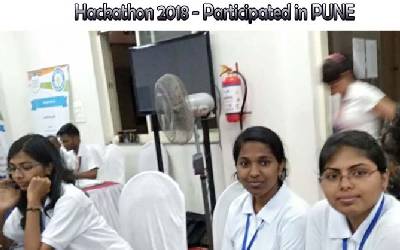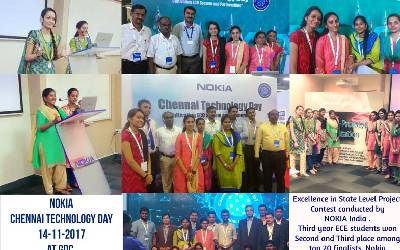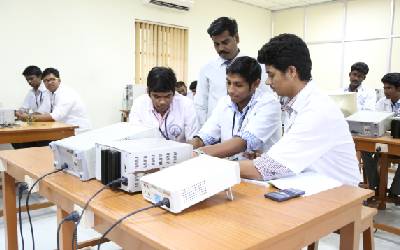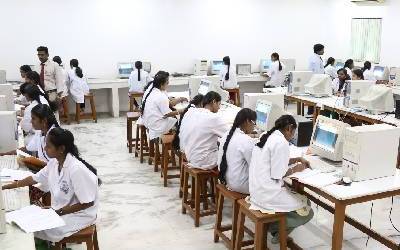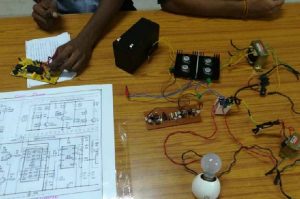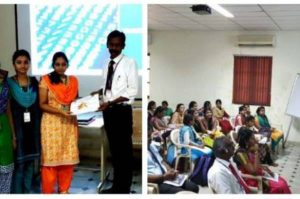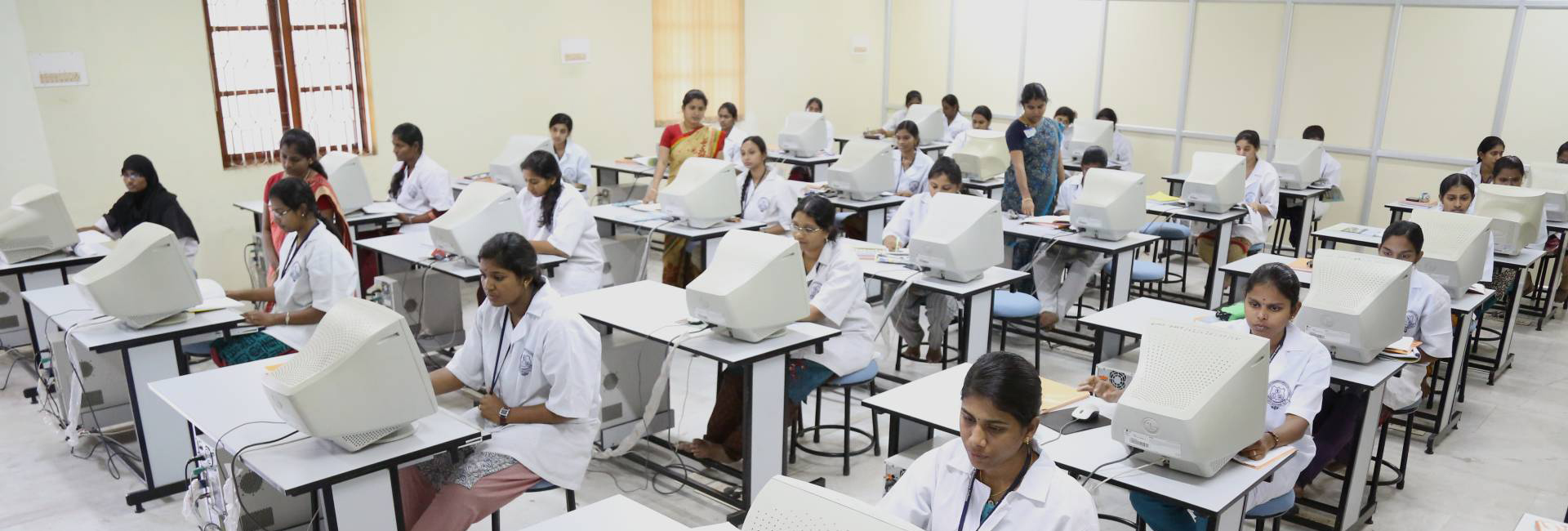
About the Department
Vision and Mission
Prog. Edu Objectives & Outcomes
HOD Profile
Faculty List
Faculty Publication
Faculty Patents
Faculty R&D Consultancy
Activities - Professional Society & Club
Events
Placement
Survey Forms
Question Bank
About the Department
Panimalar Engineering College affiliated to Anna University, Chennai, is established in the year of 2000. The college is recognized with the department named Electronics and Communication Engineering (ECE) which offers both Under Graduate and Post Graduate courses. The main focus of the ECE department is to impart the world class standard of technical education in the field of Electronics and Telecommunication for the benefit of the society.
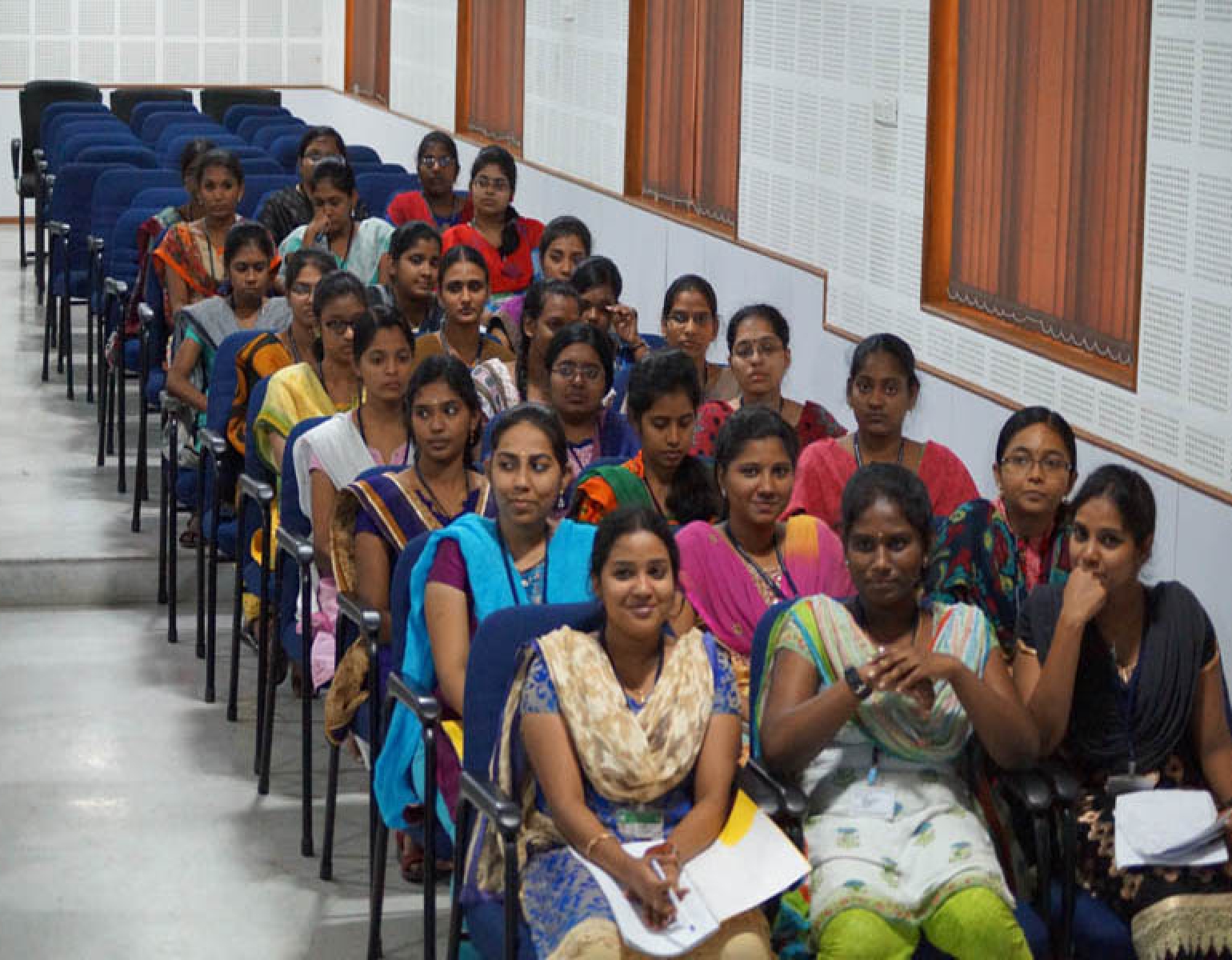
The students of both UG and PG are well qualified to meet the demands of the Industry and Research Organization. Our department is equipped with eminent faculty members who are expertise in various technical domains. The total strength of regular teaching faculty members in the department is 56, of which 9 of them are doctorates and all the remaining staff members are qualified with Masters Degree. The research activities are carried out by a group of expert research members. The overall focus of the department is to
- Emphasis elemental knowledge of the subjects.
- Provide exposure to the emerging technology.
- Inculcate a strong research and development activities
Vision and Mission

VISION
To emerge as a centre of excellence in providing quality education and produce technically competent Electronics and Communication Engineers to meet the needs of the industry and society.
MISSION
- To Provide the best facilities, infrastructure and environment to our students, researchers and faculty members to meet the challenges in the field of Electronics and Communication Engineering.
- To provide quality education through effective teaching learning process for their future career, viz placement and higher education.
- To provide insight in to the core domains with industry interaction.
- To prepare graduates adaptable to the changing requirements of the society through lifelong learning.
HOD Profile
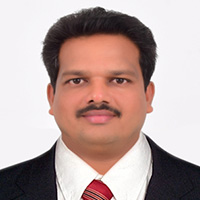
Dr.S.RAJAKUMAR M.E, Ph.D.
Professor and Head of the Department in Electronics and Communication Engineering
He received his B.E., degree in Electronics and Communication Engineering from Sun College of Engineering and Technology, Nagercoil affiliated to Manonmaniam Sundaranar University, Tirunelveli in the year 2003. He obtained his M.E., degree in Applied Electronics and Ph.D in Image Processing from Sathyabama University, Chennai, India in the year 2006 and 2013 respectively. He has a total teaching experience of 20 years. He has published several research articles in National and International Conferences and Journals. His areas of interest include Digital Signal Processing, Image Processing, Pattern Recognition, VLSI and Communication Engineering. He has published a book on Digital Image Processing and published one Patent.
He has organized AICTE sponsored Faculty Development on “Smart Perspectives of IoT on 5G Communication- Practical Approach” and Anna University approved Faculty Development Programme on “ Wireless Sensor Networks”.
Faculty List
| S.No. | Name of the Faculty | Designation |
| 1 | Dr .S. Rajakumar | Professor & Head |
| 2 | Dr.M.P.Chitra | Professor |
| 3 | Dr.C. Esakkiappan | Professor |
| 4 | Dr. A. Ameelia Roseline | Professor |
| 5 | Dr.B.Bhuvaneswari | Professor |
| 6 | Dr. S. Deepa | Professor |
| 7 | Dr. D. Selvaraj | Professor |
| 8 | Dr. S. Maheswari | Professor |
| 9 | Dr .S. Leones Sherwin Vimalraj | Professor |
| 10 | Dr.R.Manikandan | Professor |
| 11 | Dr. S. Uma Maheswari | Professor |
| 12 | Dr. D. Kalaiyarasi | Professor |
| 13 | Dr. G. Elumalai | Professor |
| 14 | Dr. J. Jeneetha Jebanazer | Professor |
| 15 | Dr.M.PremKumar | Professor |
| 16 | Dr. S.Sathiya priya | Professor |
| 17 | Dr. A.Selvarani | Professor |
| 18 | Dr. D. Nithya | Asso. Professor |
| 19 | Dr. S. Shibu | Asso. Professor |
| 20 | Dr.V.Aruna. | Asso.Professor |
| 21 | Dr.A.Dhanalakshmi | Asso.Professor |
| 22 | Dr.M.Hariprasath | Asso.Professor |
| 23 | Dr. C. Ramesh Kumar | Asso.Professor |
| 24 | Dr. R. Rajalakshmi | Asso.Professor |
| 25 | Dr.S.R.Balaji | Asso. Professor |
| 26 | Dr. N. Nithya | Asso. Professor |
| 27 | Dr. D.Arul Kumar | Asso. Professor |
| 28 | Dr. I. Poonguzhali | Asso. Professor |
| 29 | Dr.R. Suganthi | Asso. Professor |
| 30 | Mr. N. Chidambaram | Asso. Professor |
| 31 | Mrs. N. Pritha | Asso. Professor |
| 32 | Mrs.J. Brindha | Asso. Professor |
| 33 | Mr.V.Vasudevan | Asso. Professor |
| 34 | Mr.J.Navarajan | Asso. Professor |
| 35 | Mr.L.Ashok Kumar | Asso. Professor |
| 36 | Dr.T.Suguna. | Asst. Professor |
| 37 | Dr. M.Priyadharshini | Asst. Professor |
| 38 | Dr.B.Gomatheeshwari | Asst. Professor |
| 39 | Dr.Sheeba Santhosh | Asst. Professor |
| 40 | Mr.K.Sivakumar | Asst. Professor |
| 41 | Mr.M.Arun | Asst. Professor |
| 42 | Mrs. B. Sathyabhama | Asst. Professor |
| 43 | Mrs.N.Arun priya | Asst. Professor |
| 44 | Mrs.M.Jeyachitra | Asst. Professor |
| 45 | Mrs. G. Srividhya | Asst. Professor |
| 46 | Mr.R. Ashok | Asst. Professor |
| 47 | Ms.S.Meha Soman | Asst. Professor |
| 48 | Mrs. F. Anne Jenefer | Asst. Professor |
| 49 | Mr.M.D.Manigandan | Asst. Professor |
| 50 | Mrs.J.Jayaseeli Pratheepa | Asst. Professor |
| 51 | Ms.R.Monisha | Asst. Professor |
| 52 | Ms.M.Messiah Josephine | Asst. Professor |
| 53 | Mr.G.Venkatesh | Asst. Professor |
| 54 | Mr.S.Panchamurthi | Asst. Professor |
| 55 | Mrs.R.Thenmozhi | Asst. Professor |
| 56 | Mrs.M.Sandhiya | Asst. Professor |
| 57 | Ms.S.Sajini | Asst. Professor |
| 58 | Ms. M.Kaaviya | Asst. Professor |
| 59 | Mrs.Tamizhselvi | Asst. Professor |
| 60 | Mrs.M. Nalini | Asst. Professor |
| 61 | Mrs.R.Seeba Sri. | Asst. Professor |
| 62 | Mrs.K.Kavitha | Asst. Professor |
| 63 | Mr.N.Jeyakannan | Asst. Professor |
| 64 | Mrs.R.Ranjana | Asst. Professor |
| 65 | Mrs.R.Indira | Asst. Professor |
| 66 | Mrs.N.Revathi | Asst. Professor |
| 67 | Mr. P.Gayathri Devi | Asst. Professor |
| 68 | Mrs.S.Saranya | Asst. Professor |
| 69 | Mrs.K.Rajalakshmi | Asst. Professor |
Programme Educational Objectives(PEO)
Programme Outcomes (PO)
Programme Specific Outcomes (PSO)
Faculty Publication
| Year | Count |
| 2018-2019 | 53 |
| 2019-2020 | 24 |
| 2020-2021 | 56 |
| 2021-2022 | 43 |
| TOTAL | 176 |
Faculty Publication Details 2021-2022
| SNO | AUTHOR NAME | PAPER TITLE | JOURNAL NAME/ CONFERENCE NAME | PUBLISHER NAME | ISSUE/VOLUME /PAGE NO | DOI IF ANY | INDEXING | NO. OF CITATION |
| 1 | Jeevitha R, and Selvaraj D | MRI Brain abnormality detection using Conventional Neural Network (CNN) | Advances in Parallel Computing - Intelligent Computing and Communication Technology | IOS Press | Vol 38 / PP 439–443 | DOI:10.3233/APC210080 | Scopus | - |
| 2 | Vijay J, and Dr.S.Maheswari | Design of Compact Branchline Coupler | Advances in Parallel Computing - Intelligent Computing and Communication Technology | IOS Press | Vol 38 / PP 454–458 | 10.3233/APC210083 | Scopus | - |
| 3 | Anciline V, Dr.S.Maheswari | Study of Microstrip Dual-band Bandpass Filter | Advances in Parallel Computing - Intelligent Computing and Communication Technology | IOS Press | Vol 38 / PP 522–526 | 10.3233/APC210095 | Scopus | - |
| 4 | AnnletJesgna, Bharkavi A G, S Jessica Pauline and Dr.S.Maheswari | Smart wearable shoe for tracking and monitoring of army soldiers | Advances in Parallel Computing - Intelligent Computing and Communication Technology | IOS Press | Vol 38 / PP 251–255 | 10.3233/APC210046 | Scopus | - |
| 5 | Nandhini Devi, R., Leones Sherwin Vimalraj, S., Lydia, J. | Improvement of multipath channel performance for optical MIMO-OFDM in LED modulation with fully generalized spatial-frequency | Advances in Parallel Computing - Intelligent Computing and Communication Technology | IOS Press | Vol 38 / PP 464–468 | doi:10.3233/APC210085 | Scopus | - |
| 6 | R. Dinesh, S. Imran Hussain, A. AmeeliaRoseline, S. Kalaiselvam | Experimental investigation on heat transfer behavior of the novel ternary eutectic PCM embedded with MWCNT for thermal energystorage systems | Journal of Thermal Analysis and Calorimetry | Springer | 145(6)/PP. 2935–2949 | https://doi.org/10.1007/s10973-020-09726-4 | Web of Science & Scopus | 2 |
| 7 | Lydia Sharon Rose G, AmeeliaRoseline A | A Survey On Hetnet To Enhance QoS In 5G Network Using Various Techniques | Advances in Parallel Computing - Intelligent Computing and Communication Technology | IOS Press | vol.38/PP.506-510 | doi:10.3233/APC210092 | Scopus | - |
| 8 | Shiny. A, Shruti. M.S, Swathi. P, and Dr. A. AmeeliaRoseline | Telepresence Robot Using Image Processing With Python | International Journal of Scientific Research in Engineering and Management (IJSREM) | IJSREM | Issue: 06 /Vol.5/PP.1-3 | http://ijsrem.com/volume-05-issue-06-june-2021 | Google scholar | - |
| 9 | Vivian Glen P B,VenkatakrishnanS,MehaSoman | A Case Study on Multicast Protocols for Routing in MANET to Obtain Efficiency and QoS | International Journal of Engineering Research & Technology (IJERT) | IJERT | Issue: 9/ Volume: 10/ PP 488-491 | IJERTV10IS090184 | Google scholar | - |
| 10 | Ashok.R,NallapaneniSaiSindhu, Rudraraju Nidheesha2 | Segmentation And Classification of Brain TumourUsing Convolutional Neural Network | IJSART | IJSART | JSART - Volume 7 Issue 4 – APRIL 2021 | ISSN [ONLINE]: 2395-1052 | Google scholar | - |
| 11 | Ashok.R, Priya.P, SathiyaPriya.S | IoT Based Solar Panel Tracking System With Weather Monitoring |
IJSART | IJSART | IJSART - Volume 7 Issue 4 – APRIL 2021 | ISSN [ONLINE]: 2395-1052 | Google scholar | - |
| 12 | K.R.Kaviya, S.Deepa | Improved Linearly Constrained Minimum Variance Algorithm for 5G Communications System | Advances in Parallel Computing - Intelligent Computing and Communication Technology | IOS Press | Vol 38 / PP 496-500 | doi:10.3233/APC210080 | Scopus | - |
| 13 | Jeevitha R, and Selvaraj D | MRI Brain abnormality detection using Conventional Neural Network (CNN) | 3rd International conference on Intelligent Computing (IConIC 2K21) | Panimalar Engineering College/26 - 27 March 2021 | Vol 38 / PP 439-443 | doi:10.3233/APC210080 | Scopus | - |
| 14 | A.Vijayaraj , Pavithra P, N.Maheshkumar, R.Jebakumar , AdlinSheebaN.ArunPriya | Dynamic Service Orient Target Analysis Model for Improved Intrusion Detection in Cloud | Design Engineering | Design Engineering | Volume:2021,issue:8 | ISSN: 0011-9342 | | Scopus | - |
| 15 | D Kalaiyarasi, Shruthi.V , VishnuPraba.A , Vanaja.S | Hand movement based message transmission and body physical parameters remote monitoring device for disabled people | Advances in Parallel Computing - Intelligent Systems and Computer Technology | IOS Press | Volume:38, Issue 1,pp.459-463 | doi:10.3233/APC210084 | Scopus | - |
| 16 | Mirunalini.C, Marisgandhimathi.P.S, Nithyashree.KPriyadharshini S, Sathyabhama .B | A 10-Bit 50-Ms/S Monitoring SAR ADC with A Monotonic Capacitor Switching Procedure |
International Journal of Innovative Research in Computer and Communication Engineering | IJIRCCE | Volume 9, Issue 7 | DOI: 10.15680/IJIRCCE.2021.0907122 | Google Scholar | - |
| 17 | B. Sathyabhama, B. Siva Shankari | An Ultra-Low Power Implantable Medical Devices: An Engineering Perspective | Journal of University of Shanghai for Science and Technology | University of Shanghai | Volume 23, Issue 12, December - 2021 | D.O.I - 10.51201/JUSST/21/11920 | Scopus | - |
| 18 | G.Srividhya, , T. Sivasakthi , R. Srivarshini , P. Varshaa and S. Vijayalakshmi |
Enhanced And Efficient Carry Select Adder With Minimal Delay |
Advances in Parallel Computing - Intelligent Systems and Computer Technology | IOS Press | Volume:38, Issue 1 | doi:10.3233/APC210070 | Scopus | - |
| 19 | Subiksha M, Supreetha P, VipparlaDivya, YanamalaPravalika, R. Rajalakshmi | A Low Power 8GS/S Comparator For High Speed Analog To Digital Conversion | International Journal of Innovative research in Computer and Communication Engineering | IJIRCCE | Volume 9 | DOI: 10.15680/IJIRCCE.2021.0907157 | Google scholar | - |
| 20 | Nivetha.Y, Malarmini.M.R, Monisha.B, Dr.S.Leones Sherwin Vimalraj | High Speed Railway Communication Using Moving Relay in 5G | International Journal of Innovative Research in Computer and Communication Engineering | IJIRCCE | Volume 9, Issue 7, July 2021, pp. 8744-8749 | 10.15680/IJIRCCE.2021.0907156 | | Google Scholar | - |
| 21 | RajalakshmiRamanathan, Joshne Jenson and DivyaDharshini | IoT Based Smart Meter Designed For The Monitoring Of Power Consumption In Industries | International ConferenceFor PheonixesOnEmergingCurrentTrends On Intelligent Computing, PECTEAM 2K22 – IconIC |
Panimalar Engineering College, Chennai, March 25’2022 | - | - | - | - |
| 22 | Ragunathan K, Rajakumar S and Subraja R | Detection of Breast Cancer Tissues in Mammogram Images Using Deep Learning Method | International ConferenceFor PheonixesOnEmergingCurrentTrends On Intelligent Computing, PECTEAM 2K22 – IconIC |
Panimalar Engineering College, Chennai, March 25’2022 | - | - | - | - |
| 23 | NithyaDorairajan, Sachin S R, PradeepNandha V and Roshan Kumar S | Design of a Compact Microstrip Patch Filtering Antenna for WLAN Applications | International ConferenceFor PheonixesOnEmergingCurrentTrends On Intelligent Computing, PECTEAM 2K22 – IconIC |
Panimalar Engineering College, Chennai, March 25’2022 | - | - | - | - |
| 24 | Lydia Sharon Rose G and AmeeliaRoseline A | An Examination on Routing Protocols with Energy Utilization for Wireless Sensor Networks Using Diverse Algorithms | International ConferenceFor PheonixesOnEmergingCurrentTrends On Intelligent Computing, PECTEAM 2K22 – IconIC |
Panimalar Engineering College, Chennai, March 26’2022 | - | - | - | - |
| 25 | Sajini S, Bhuvaneswari B and Deepa S | Versatile Analysis Of Reconfigurable Antenna Arrays For MiIMO Applications | International ConferenceFor PheonixesOnEmergingCurrentTrends On Intelligent Computing, PECTEAM 2K22 – IconIC |
Panimalar Engineering College, Chennai, March 26’2022 | - | - | - | - |
| 26 | Kaaviya M, Deepa S and Bhuvaneswari B | A Comprehensive study on channel estimation techniques using machine learning for Massive MIMO systems | International ConferenceFor PheonixesOnEmergingCurrentTrends On Intelligent Computing, PECTEAM 2K22 – IconIC |
Panimalar Engineering College, Chennai, March 26’2022 | - | - | - | - |
| 27 | AncilineVargees and Maheswari S | Survey Of Mulitiband Branch Line Coupler | International ConferenceFor PheonixesOnEmergingCurrentTrends On Intelligent Computing, PECTEAM 2K22 – IconIC |
Panimalar Engineering College, Chennai, March 26’2022 | - | - | - | - |
| 28 | Vishnu Teja M, Leones Sherwin Vimalraj S and Lydia J | Survey on Data Communication for UAV and Flight control system in MM Wave communications | International ConferenceFor PheonixesOnEmergingCurrentTrends On Intelligent Computing, PECTEAM 2K22 – IconIC |
Panimalar Engineering College, Chennai, March 26’2022 | - | - | - | - |
| 29 | Vidhya D and Shibu S | Survey On Pedestrian Reidentification Monitoring System Based On Deep Convolutional Neural Network | International ConferenceFor PheonixesOnEmergingCurrentTrends On Intelligent Computing, PECTEAM 2K22 – IconIC |
Panimalar Engineering College, Chennai, March 26’2022 | - | - | - | - |
| 30 | Kalaiyarasi D, RubeshKumaar.C, KeerthiVasan. P, Kingsley Roy. S and Karanesvaran V | Design Of Smart Mirror With IoT | International ConferenceFor PheonixesOnEmergingCurrentTrends On Intelligent Computing, PECTEAM 2K22 – IconIC |
Panimalar Engineering College, Chennai, March 26’2022 | - | - | - | - |
| 31 | Nithya N, Latha P, Kannagi V and Akshaya M | Radio Frequency Based Communication on Autonomous Speed Control of the Automobiles in Restricted Areas using IoT | InternationalConferenceFor PheonixesOnEmergingCurrentTrends On Intelligent Computing, PECTEAM 2K22 – IconIC |
PanimalarEngineering College, Chennai, March 26’2022 | - | - | - | - |
| 32 | Rajeswari M, Pavithra A, Shalini M, Sophia J and AmeeliaRoseline A | Hand Gesture Recognition And Emerging Technologies in Sign Language | International ConferenceFor PheonixesOnEmergingCurrentTrends On Intelligent Computing, PECTEAM 2K22 – IconIC |
Panimalar Engineering College, Chennai, March 26’2022 | - | - | - | - |
| 33 | Pavithra K, AmeeliaRoseline A, JayaseeliPratheepa J and Lydia Sharon Rose G | Green Communication Systems And Networks In Various Wireless 5G Techniques | International ConferenceFor PheonixesOnEmergingCurrentTrends On Intelligent Computing, PECTEAM 2K22 – IconIC |
Panimalar Engineering College, Chennai, March 26’2022 | - | - | - | - |
| 34 | A Charumathi, F Anne Jenefer, K Sivakumar, G Elumalai, D Selvarajand D Arulkumar | A Smart approach for Health Monitoring System Using Artificial Intelligence | International ConferenceFor PheonixesOnEmergingCurrentTrends On Intelligent Computing, PECTEAM 2K22 – IconIC |
Panimalar Engineering College, Chennai, March 26’2022 | - | - | - | - |
| 35 | R.P Monisha, R Thenmozhi, M Premkumar, D Selvaraj, G Elumalai and D Dhinakaran | Need For 6G: A Survey | International ConferenceFor PheonixesOnEmergingCurrentTrends On Intelligent Computing, PECTEAM 2K22 – IconIC |
Panimalar Engineering College, Chennai, March 26’2022 | - | - | - | - |
| 36 | Priya B, Maheswari S and Jayanthy T | A Comparative Analysis Of Various MicrostripBranchlineBalun | International ConferenceFor PheonixesOnEmergingCurrentTrends On Intelligent Computing, PECTEAM 2K22 – IconIC |
Panimalar Engineering College, Chennai, March 26’2022 | - | - | - | - |
| 37 | PrincyPriyadharshini D, Kannan P and Maheswari S | A Review On Microstrip Low Pass Filter Design | International ConferenceFor PheonixesOnEmergingCurrentTrends On Intelligent Computing, PECTEAM 2K22 – IconIC |
Panimalar Engineering College, Chennai, March 26’2022 | - | - | - | - |
| 38 | Harinee G A and Deepa S | Advanced Antenna Design For 5G Mm Wave Technology | International ConferenceFor PheonixesOnEmergingCurrentTrends On Intelligent Computing, PECTEAM 2K22 – IconIC |
Panimalar Engineering College, Chennai, March 26’2022 | - | - | - | - |
| 39 | Priyanka Devi S, Leones Sherwin Vimalraj S, Lydia J, Ramesh Kumar C and Rajasekar M | A Survey On Enabling 5G Tech For High-Speed Train Communications | International ConferenceFor PheonixesOnEmergingCurrentTrends On Intelligent Computing, PECTEAM 2K22 – IconIC |
Panimalar Engineering College, Chennai, March 26’2022 | - | - | - | - |
| 40 | Blessy Sharon Gem J, Shibu S, Ramesh Kumar C, Ashok R, Badri Narayanan D and Murugavel D | QoS Based Power Allocation In 5G Wireless Networks | International ConferenceFor PheonixesOnEmergingCurrentTrends On Intelligent Computing, PECTEAM 2K22 – IconIC |
Panimalar Engineering College, Chennai, March 26’2022 | - | - | - | - |
| 41 | Sushmitha V, Kalaiyarasi D and Sivakumar K | Review On FIR Filter Based Booth Multiplier Using ESSA And VL-CSKA | International ConferenceFor PheonixesOnEmergingCurrentTrends On Intelligent Computing, PECTEAM 2K22 – IconIC |
Panimalar Engineering College, Chennai, March 26’2022 | - | - | - | - |
| 42 | Preetha T.K, Bhuvaneswari B, Poojitha R, Pooja E and Rachel Keziah A | Comprehensive Study Of Reconfigurable Intelligent Surfaces On Wireless Communication | International ConferenceFor PheonixesOnEmergingCurrentTrends On Intelligent Computing,PECTEAM 2K22 – IconIC | Panimalar Engineering College, Chennai, March 26’2022 | - | - | - | - |
| 43 | Sangeetha S.S and Rajakumar S | Advanced Antenna Designs For Small Satellites-CubeSats | International ConferenceFor PheonixesOnEmergingCurrentTrends On Intelligent Computing, PECTEAM 2K22 – IconIC | Panimalar Engineering College, Chennai, March 26’2022 | - | - | - | - |
Faculty Patents
|
DEPARTMENT OF ECE |
||||||
|
|
Dr.B.Bhuvaneswari Professor, Dept. of ECE |
10 DB symmetric bend Meander line directional coupler with high directivity | 08-10-2015 | 5384/CHE/2015 | Published | |
|
|
Dr.B.Bhuvaneswari Professor, Dept. of ECE B.Pradeep,L. Pradeep Kumar (IV students) S.Singaravelan |
Effect of placing parasitic directions in micro strip patch antenna for improved bandwidth and direction | 08-04-2015 | 1850/CHE/2015 | Filed | |
|
|
Dr.P.Kannan, Professor, Dept. of ECE V.Srikanth,C.Dinesh Kumar, A.Tobin (IV students) |
Classification of osteoporosis using statistical and fractal texture features | 01-04-2015 | 1755/CHE/2015 | March 2017 | Filed |
|
|
Dr. S.Raja kumar Professor, Dept. of ECE Mrs. R.Rajalakshmi Associate Professor, Dept. of ECE |
Hybrid Feature Extraction of Diseased Plant Leaf Identification Using Contour Let Transform and supervised classifier | 04-02-2016 | 201641007674 Ordinary application /E-2/697/2016-CHE |
Filed | |
|
|
Dr.Ameelia Roseline Professor, Dept. of ECE |
Design of Wideband circular patch antenna for 2.4Ghz ISM Band Applications | 02-03-2016 | 201641007299 Ordinary application / E-2/662/2016-CHE |
Filed | |
|
|
Dr.P.Kannan, Professor, Dept. of ECE Dr.B.Bhuvaneswari Professor, Dept. of ECE Ms.S.L.Bharathi, Asst.Prof, Dept. of ECE |
Detecting and rectifying the leakage of underground water pipeline system | 02-03-2016 | 201641007313 Ordinary application /E-2/665/2016-CHE |
Filed | |
|
|
Dr.S.Deepa Professor, Dept. of ECE Mrs.B.Sathyabhama Asst.Professor, Dept of ECE Dr.P.Kannan, Professor, Dept. of ECE |
Reconfigurable power efficient comparators for ADCs in portable medical devices | 20-01-2016 | 201641002031 Ordinary application/E-2/194/2016-CHE/ E-2/1835/2016-CHE |
Filed | |
|
|
Dr.B.Bhuvaneswari Professor, Dept. of ECE Dr.P.Kannan, Professor, Dept. of ECE |
Design and Analysis of wearable PIFA Antenna | 20-01-2016 | 201641002034 Ordinary application/E-2/197/2016-CHE |
Filed | |
|
|
Dr. B.Bhuvaneswari Professor, Dept. of ECE Dr.S.Maheswari Professor, Dept. of ECE Dr.P.Kannan Professor, Dept. of ECE |
Implementation of 10dB Asymmetric Directional Couplers with High Directivity | 20-01-2016 | 201641002033 Ordinary application/E-2/196/2016-CHE |
Filed | |
|
|
Dr.B.Bhuvaneswari Professor, Dept. of ECE Mr.N.Chidambaram Asst.Prof, Dept. of ECE Ms.S.L.Bharathi Asst.Prof, Dept. of ECE |
Investigation of Active antenna for HF applications | 20-01-2016 | 201641002032 Ordinary application/E-2/195/2016-CHE |
Filed | |
|
|
Mr.R.Jayarajan Associate Professor, Dept. of ECE |
Force reaction vector meter | 20-06-2016 | 201641020961 Ordinary application/E-2/1840/2016-CHE |
Filed | |
|
|
Dr.P.Kannan Professor, Dept. of ECE Ms.N.Nithya Associate. Prof, Dept. of ECE |
Crosstalk minimization in optical WDM system based on decomposed and differently polarized signal. | 20-06-2016 | 201641020965 Ordinary application/E-2/1841/2016-CHE |
Filed | |
|
|
Dr.Ameelia Roseline Professor, Dept. of ECE |
Design of dualband and wideband microstrip planar antenna for upper WLAN and WMAN applications. | 20-06-2016 | 201641020970 Ordinary application/E-2/1845/2016-CHE |
Filed | |
|
|
Dr.P.Kannan Professor, Dept. of ECE Mrs.D.Kalaiyarasi Associate Professor, Dept. of ECE |
A Flexible speed FFT/IFFT processor for wireless systems | 20-06-2016 | 201641020959 Ordinary application/E-2/1838/2016-CHE |
Filed | |
|
|
Dr.B.Bhuvaneswari Professor, Dept. of ECE S.Sankara Lalitha S.Sherley Gnanam Empress (IV students) |
Design of compact dielectric resonator antenna for wireless applications | 20-06-2016 | 201641020966 Ordinary application/E-2/1842/2016-CHE |
Filed | |
|
|
Dr.B.Bhuvaneswari Professor, Dept. of ECE R. Sharon Naveena (IV students) |
Unmanned car parking system for wifi applications. | 20-06-2016 | 201641020967 Ordinary application/E-2/1843/2016-CHE |
Filed | |
|
|
Dr.D.Selvaraj Prof/ECE |
A Smart IOT based system to Assist person in the process of Dialysis | 26-02-2022 | 202211010377 | Feb 2022 | Published |
|
|
Dr.D.Selvaraj Prof/ECE |
Identifying Agriculture challenge by Integrating anomaly with deep learning approach | 03-02-2022 | 202241005850 | Feb 2022 | Published |
|
|
Dr.D.Selvaraj Prof/ECE |
Designing Robot with dielectric material to work in High voltage Electric Environment | 12-03-2022 | 202241013549 | Mar 2022 | Published |
|
|
Dr.D.Selvaraj Prof/ECE |
An efficient system to monitor the cultivation of crop patterns based on soil fertility using deep learning techniques | 19-03-2022 | 202241015028 | Mar 2022 | Published |
|
|
Dr.Leones Sherwin Vimalraj Prof/ECE |
A Hybrid Electric Vehicle using Bi-Directional DC-DC conversion Apparatus | 02-02-2021 | 202141004471A | - | Filed |
|
|
Dr.G.Elumalai Prof/ECE |
Machine Learning Techniques and system for Solving a Prediction Problem | 18-10-2021 | 202141047297 | Oct 2021 | Filed |
|
|
Dr.G.Elumalai Prof/ECE |
Artificial Intelligence(AI) Based Gas detection and Prevention Device using Microcontroller and Zigbee approach | 10-02-2022 | 202241007199 | Feb 2022 | Filed |
|
|
Dr.D.Kalaiyarasi Prof/ECE |
AI, IoT based real time condition monitoring of Electrical Machines using Python Language | 19-03-2022 | 202241015285 | March 2022 | Filed |
Faculty R&D Consultancy-
| Year | No. of consultancy projects | Amount(RS) |
|
2018-19 |
5 |
1,33,500 |
|
2019-20 |
7 |
2,52,000 |
|
2020-21 |
6 |
2,28,000 |
|
2021-22 |
5 |
1,50,000 |
Club Activities
ROBOBOUT CLUB
ROBOBOUT Club provides a platform to bring out the innovation mindset for all the robot enthusiasts
Professional Societies

IETE STUDENT FORUM
IETE Student branch was to provide global platform to inspire, enable, develop and support students as the future leaders of our profession..

IEEE Chapter
IEEE Student branch was to provide global platform to inspire, enable, develop and support students as the future leaders of our profession.
Events
Survey Forms
Content beyond syllabus feedback form
Department Library
The Department Library has separated from central Library which provides the faculties and students latest informations in technical education research and development activities.
| Dept | Total No. of Volumes | Total No. of Titles |
|---|---|---|
| ECE | 1994 | 471 |
These Library subscribes 32936 National & International E-Journals including
- EBSCO
- J-Gate
- ASTM
- Mcgraw Hil
- STM Journal
In addition 4211 E-Books in all the fields of Engineering, Management, Basic Science and Humanities is the regular feature of our library. Every effort has been made to obtain all titles recommended by the faculty.
Question Bank - Academic Year 2023-24 (Even Semester)
| YR/SEM | SUB CODE | SUB TITLE | GOOGLE SITES |
|
II yr/ |
21EC1401 |
INTRODUCTION TO ARTIFICIAL INTELLIGENCE AND MACHINE LEARNING |
|
|
21EC1402 |
CONTROL SYSTEM ENGINEERING |
https://sites.google.com/view/control-systems-engineering/home |
|
|
21EC1403 |
FUNDEMENTALS OF DATA STRUCTURES IN C |
||
|
21EC1404 |
ANALOG INTEGRATED CIRCUITS |
https://sites.google.com/view/21ec1404-analogintegratedcircu/home |
|
|
21MA1403 |
PROBABILITY AND RANDOM PROCESSES |
||
|
21MC1201 |
ENVIRONMENTAL SCIENCE |
||
|
21EC1412 |
ANALOG INTEGRATED CIRCUITS LAB |
||
|
21EC1413 |
FUNDEMENTALS OF DATA STRUCTURES IN C LAB |
||
|
21EC1401 |
ARTIFICIAL INTELLIGENCE AND MACHINE LEARNING LAB |
||
| III YEAR / VI SEM |
21EC1601 |
WIRELESS COMMUNICATION |
https://sites.google.com/view/wireless-communi/question-bank |
|
21EC1602 |
ANTENNA THEORY AND DESIGN |
https://sites.google.com/view/21ec1602antennatheoryanddesign/question-bank |
|
|
21EC1603 |
VLSI AND CHIP DESIGN |
https://sites.google.com/view/21ec1603-vlsi-and-chip-design/question-bank |
|
|
21EC1604 |
DATA COMMUNICATION NETWORKS |
https://sites.google.com/view/21ec1604datacommnnetworks/home |
|
|
21EC1929 |
WIRELESS NETWORKS |
https://sites.google.com/view/21ec1929-wirelessnetworks |
|
|
21EC1011 |
TELEHEALTH TECHNOLOGY |
||
|
21EC1611 |
VLSI DESIGN LABORATORY |
||
|
21EC1612 |
WIRELESS COMMUNICATION AND NETWORKS LABORATORY |
||
| IV YEAR / VIII SEM |
EC8093 |
Digital Image Processing |
https://sites.google.com/view/ec8093-digital-imageprocessing/home |
|
EC8094 |
Satellite Communication |

Login Access
Click Here

Video Lectures
Click Here

